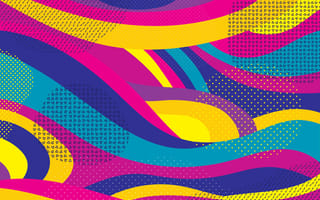It’s not hard to find a good story in the tech industry. The problem is that due to the industry’s staggering gender gap, most of these stories center on the struggles and accomplishments of men. Stories about starting a company after dropping out of college or while working out of a garage command attention, but they’re not the only ones capable of inspiring and exciting the technologists of tomorrow.
In this article, we aim to provide a platform for female technologists to share the stories of how they got into engineering, the biggest challenges they’ve faced, and their advice to the next generation of women in tech. You’ll meet a former geologist turned product manager, an academic who fell in love with data science, a senior tech leader who discovered her dream job after the first two companies she worked for folded, and more.
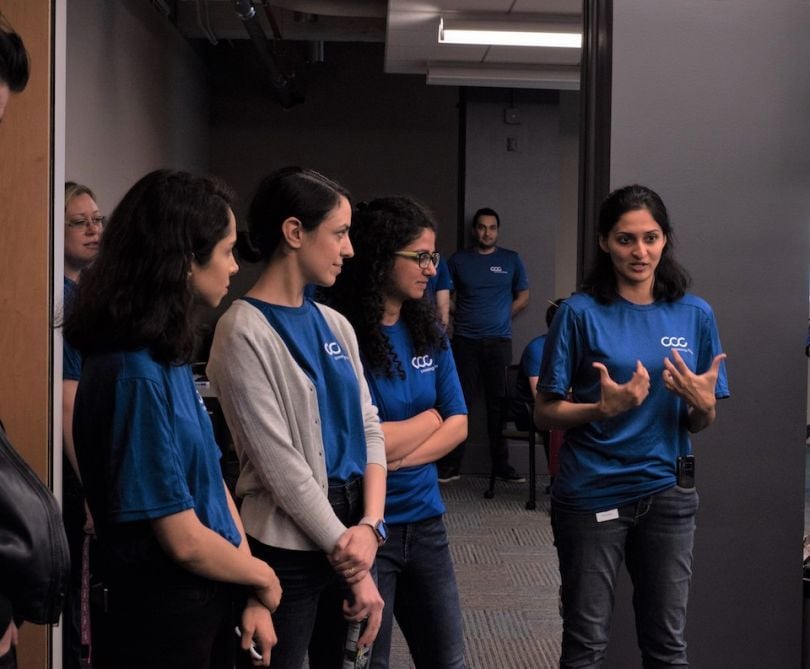
CCC
CCC’s technology solutions are designed to increase connectedness among companies in the automotive industry, including insurance carriers, manufacturers, parts suppliers and collision repair shops. Ranjini Vaidyanathan was in academia and earned a PhD before realizing she had a passion for data science. While changing focuses wasn’t always easy, Vaidyanathan said the transition was made easier by some simple, yet powerful, advice from her mentors.
"When the going gets tough, what’ll help you pull through is your passion for the technical work.”
How did you get into engineering?
I studied applied science and mathematics before finally switching to data science after my PhD. It took me some time to decide what, exactly, I wanted to pursue. I had been doing pen-and-paper theory work as a student, but after a certain point, I realized I found applied problems more interesting.
What’s the biggest challenge you’ve faced in your career, and how have you worked to overcome it?
Switching fields from academia to data science was challenging. I had to brush up industry-relevant skills like programming, and also adjust to the paradigm shift in thinking, both in terms of technical and soft skills. It helped to have great mentors who taught me the importance of maintaining my individuality while navigating these changes, and that I didn’t need to fundamentally change my personality in order to be effective.
What advice or tips do you have for women pursuing careers in engineering?
Identify the kind of problems that excite you over an extended period of time. When the going gets tough, what’ll help you pull through is your passion for the technical work more than anything else.
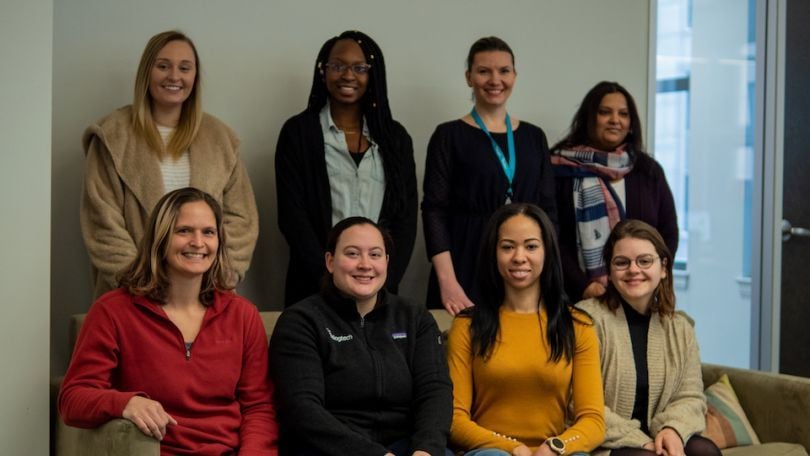
DialogTech
DialogTech’s AI-powered call analytics solutions help companies get a clearer picture of how their marketing efforts are driving inbound calls, and how those conversations impact the customer journey. Senior Product Manager Lori Eich kicked off her tech career after working for three years as a geologist. Eich said going from earth science to engineering was made easier by her willingness to ask questions, learn new things and trust in her problem-solving skills.
How did you get into engineering?
When I was a kid, every answer I ever had to, “What do you want to be when you grow up?” was something related to science or technology. I can’t remember ever seeing myself as anything but “a scientist who does experiments” or “genetic engineer” or “person who builds something awesome.” I’ve always been a problem solver, and even today as an “adult” I spend a lot of my free time playing strategy games and doing puzzles. I studied geology and geophysics in college and grad school, mostly because I like that it combines all of the other sciences into an Earth-sized 3D jigsaw puzzle of plate tectonics.
After pursuing geology for a few years, an opportunity arose to join a software engineering team. I’d taken some computer science courses in college, and was going to be working for a person I really trusted as a mentor, so I jumped in feet first. I eventually pivoted from engineering to product management. I like exploring how my team can use engineering solutions to solve our customers’ problems and thinking about how to make software more functional, usable and useful.
"Don’t let the fact that you don’t know a certain coding language or machine learning technique be the thing that keeps you from giving it a shot.”
What’s the biggest challenge you’ve faced in your career, and how have you worked to overcome it?
The biggest challenge I had was jumping into a software engineering role after spending about three years away from writing code. To get myself up to speed quickly, I spent a lot of time walking through my team’s code base to understand the patterns and tools already in place. I also devoted about 10 hours per week to software engineering courses on the MIT EdX platform. Most importantly, I wasn’t afraid to ask questions because I had a good relationship with my mentor. I knew he had confidence in my problem-solving skills, and he knew he could trust me to learn quickly.
What advice or tips do you have for women pursuing careers in engineering?
Your best asset is your ability to solve problems. Don’t let the fact that you don’t know a certain coding language or machine learning technique be the thing that keeps you from giving it a shot. You can learn new tools, techniques and coding languages — but those are all just vehicles for you to exercise your problem-solving skills.
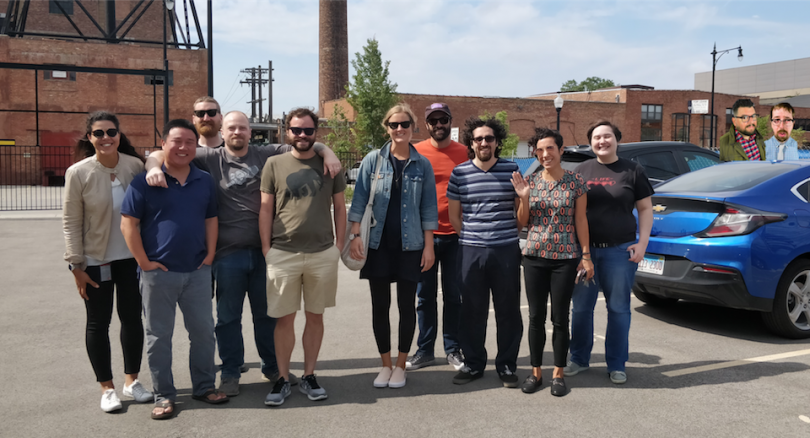
Jellyvision
Jellyvision’s software is used by companies to make the process of choosing important employee benefits more engaging and enjoyable. Director of Data Engineering Marina Malaguti’s love of engineering started in childhood, although it didn’t begin with a computer.
How did you get into engineering?
My interest in engineering started when I received my first real gift from my father at nine years old: a broken pink analog watch. We fixed it together, and I fell in love with being challenged by a great problem.
"My biggest challenge has been to prove myself to people who doubted my abilities.”
What’s the biggest challenge you’ve faced in your career, and how have you worked to overcome it?
I have been told my biggest challenge has been to not have traditional engineering training. But I actually think my biggest challenge has been to prove myself to people who doubted my abilities. I continuously put immense effort into learning new tech, applying those concepts hands-on to contribute in some way to the data science and engineering industry. At the same time, I am extremely grateful to the people who gave me the chance to prove to them that I can excel at what I do, and that traditional training is not a requirement, but hard work is.
What advice or tips do you have for women pursuing careers in engineering?
Skills are important: acquire them and go deep into the “why” of theories and concepts. Also remember that even more important is the person whose life you are going to affect. Great engineering is created with the person in mind.
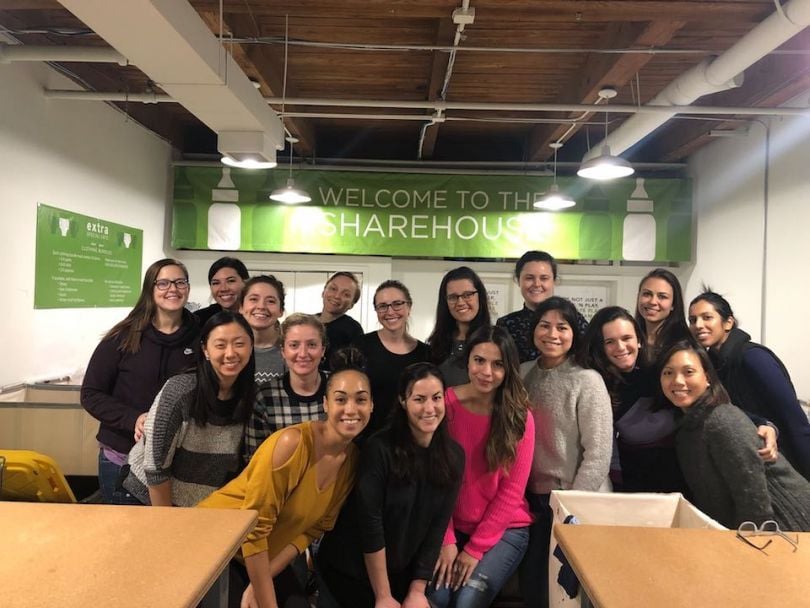
Rocketmiles
Rocketmiles is an online booking platform that partners with hotels to make travel more rewarding, providing airline miles and other bonuses to consumers for their stays. Lead QA Engineer Sasha Korobko has worked in tech for over a decade and said her hardest challenge was identifying what she did — and didn’t — want in a career.
How did you get into engineering?
I was born and raised in a post-Soviet Eastern European country and didn’t have much choice in deciding what I wanted to do in life. My family made that decision for me. They wanted me to learn skills that would be practical in the future. I didn’t even like what I was learning when I was in college. But a decade later, I admit that it was one of the best decisions that anybody could ever make for me. I couldn’t imagine myself doing anything else.
"Being honest with myself and eliminating things I never wanted to do again in my career lead me to an amazing opportunity.”
What’s the biggest challenge you’ve faced in your career, and how have you worked to overcome it?
My biggest challenge was to learn what I wanted to do once I reached a certain level and a certain title. Being honest with myself and eliminating things I never wanted to do again in my career lead me to an amazing opportunity at Rocketmiles, which has been my home for over three years now. It combines everything I envisioned myself doing and more. Since I don’t know what the future will bring, I just allow myself and my responsibilities to evolve and be reactive. The only constant thing is me staying in tech forever.
What advice or tips do you have for women pursuing careers in engineering?
Lean into the women in tech community. In Chicago, it is welcoming and accepting. It is so easy to build your network, find a mentor and ask for help. Most of the women that I’ve met in the Chicago tech scene want to give back and encourage other women to seek support. Just know that there is a massive support force that you can always reach out to.
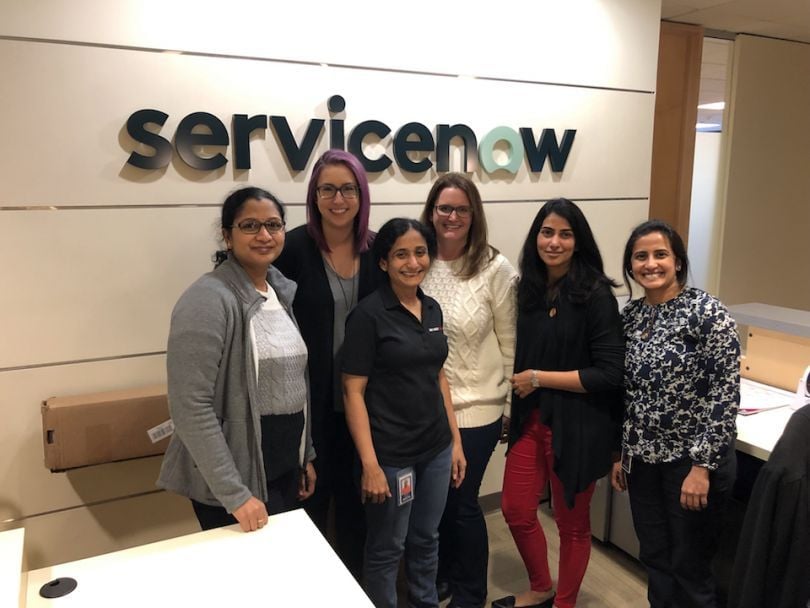
ServiceNow
ServiceNow's cloud-based workflow management and collaboration software is designed to boost productivity and send projects smoothly from one team to the next.
Quality Assurance Manager Sri Vattikuti said coding has now become a life skill, regardless of which professional path you choose.
Share the story of how you got into engineering.
I grew up in India. When I went to college in the 1990s, the tech revolution was starting to take hold there. I was attracted to technology in the beginning because it just seemed cool. Working on computers was not common or integral to our lives at that point, and I found it really fun. As I got deeper into studying coding, I realized the critical role it plays in our everyday lives — mostly without us even knowing. So, I got my master’s and turned my excitement into a career.
"Take a computer class, a software class, a coding class — even if you don’t make a career out of it, it will give you a better understanding of how things work.”
What is the biggest challenge you've faced in your career, and how have you worked to overcome it?
As a working mother, my biggest challenge has been juggling work and home. Fortunately, I have had managers who understand the challenges of a young family, and each time I went back to work after maternity leave, they gave me a lot of support. When you work in IT, it’s pretty easy to work from home when needed, and my managers have always trusted me to balance work and family, whether I was in the office or remote.
Any advice or tips for other women in engineering?
I think coding has become a life skill now, no matter what career you choose. But it can be more daunting for women to explore engineering as a career because other fields are more often romanticized as better choices for us. My advice is this: Don’t doubt yourself — just try it. Take a computer class, a software class, a coding class. Even if you don’t make a career out of it, it will give you a better understanding of how things work. No matter your background, no matter your interests, you can learn. It’s only scary until you try it.
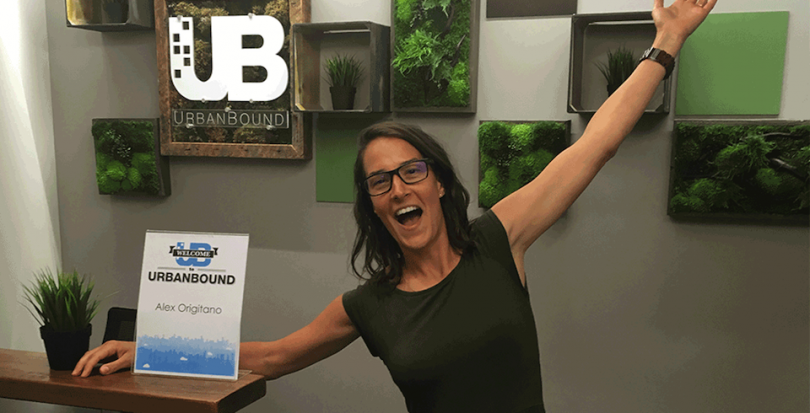
UrbanBound
UrbanBound’s software is used by employers and employees to make the process of managing, tracking and accessing relocation benefits easier. Associate Software Engineer Alex Origitano actually discovered her passion for coding while working on the company’s customer success team. She took the leap and joined a coding bootcamp, where she learned web development skills — and the value of being a patient learner.
How did you get into engineering?
I’ve worked at UrbanBound twice, the first time as a relocation consultant on the customer success team. While I loved working with the customer success team, I immediately clicked with some of the engineering team when I was asked to be a stakeholder in the company’s agile process. It wasn’t long before my coding coworkers encouraged me to become an engineer. I completed a Codecademy Ruby course that was recommended to me, and it was only a matter of time before I worked up the courage — and the savings — to apply to Dev Bootcamp.
I left UrbanBound to attend DBC, but I stayed in touch with my UrbanBound coworkers. A few of them even helped explain what in the world a “class” is. This support and a genuine appreciation for the people at UrbanBound is what brought me back less than two years later as an associate software engineer.
"Anyone with grit, persistence and genuine curiosity for coding can become a software developer.”
What’s the biggest challenge you’ve faced in your career, and how have you worked to overcome it?
The largest obstacle I have had to overcome is being patient with myself while learning. I can be hard on myself, which leads to me being self-defeating. I used to think if I didn’t understand a concept the first time around, it was because I was not smart enough. Now I realize that learning is a process. It takes time. I didn’t learn how to walk on the first try, so why would a complicated algorithm make sense the first time? It’s important to give yourself a break and move forward knowing that what you learn each day takes you a step further than you were the day before.
What advice or tips do you have for women pursuing careers in engineering?
Anyone with grit, persistence and genuine curiosity for coding can become a software developer. It doesn’t take a special mind or require exceptional math skills. What it does take is a lot of Googling, and much like everything else in life, support from friends and family. The tech community has a ways to go when it comes to being inclusive, which is why it’s so important to seek out teams and companies like UrbanBound that acknowledge these inclusivity shortcomings and make coding accessible to everyone — even people with a non-tech background. So, if you are considering a career in coding, start a dialogue with an engineer. I promise they would love to talk to you about what they do for a living and will give you advice and resources to help get you started. Maybe you’ll find out it’s the career you have been looking for and didn’t know existed.
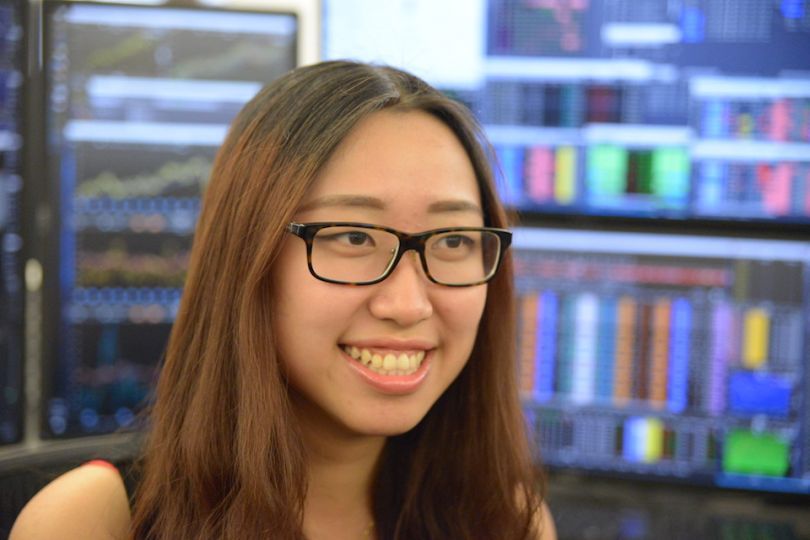
PEAK6
PEAK6 is an investment firm that has used its proprietary technology to manage risk and uncover overlooked market opportunities for over 20 years. Roxy Rong is a trader at the company who said her background in programming gives her an edge when it comes to problem-solving and developing new strategies. Her advice to the next generation of female technologists is to not be afraid to speak up, seek mentorship and set high standards for yourself.
How did you get into engineering?
Growing up, I was interested in science and math. I decided to major in actuarial science at the University of Wisconsin. After an internship in my field, I decided to move to finance. I thought that I would give trading a try, but I didn’t know anything about trading. I met a PEAK6 campus recruiter and learned that the trading associate program accepted people without any trading experience. As a trading associate, we learned in two weeks everything I had learned at school in four years.
After two months in a class environment, we had a rotation with senior traders. I learned the most when we’d regroup at the end of each trading day and talk about the best and worst trades. I love problem-solving and it’s an exciting process to develop new trading strategies, specifically with automation. Being creative gives me an edge, and because I have strong programming skills and trading context, I am able to help our company. The market is fun to interact with: It’s like interacting with the whole world.
"I love problem-solving and it’s an exciting process to develop new trading strategies, specifically with automation.”
What advice or tips do you have for women pursuing careers in engineering?
Seek out mentors and senior engineers within the firm and take any opportunity to learn from them. Have high standards for yourself and your work. Whenever you see things that can be improved, speak up and know your words can carry weight.
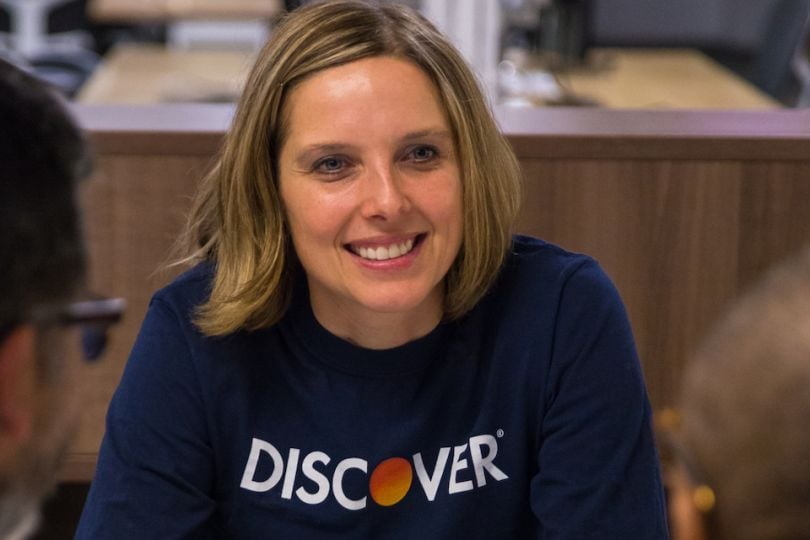
Discover
Discover is a Chicagoland-based company that offers banking, payment solutions and financial services to customers around the globe. Senior Manager of Cloud Engineering Heather Martin became interested in all things computers during high school. Martin has seen both the ups and downs of the tech industry, and to her, the most important thing in navigating it all and building a long career has been to strike a balance and set boundaries.
How did you get into engineering?
I have always been a naturally inquisitive person, and from a young age, my family was certain I was going to pursue a career in law. I was fortunate enough to be accepted into a technical high school with a focus on math and science, which allowed for me to be exposed to a wealth of computer and technical electives. I fell in love with using computers to systematically solve problems and became obsessed with gaining a deeper understanding of how things worked — never mind that some of my obsessions resulted in pulling things apart that I could never quite put back together! I obtained a degree in computer science and have been working in engineering ever since.
"Be inquisitive and always willing to reinvent yourself, adapt and change. But above all else, find a way to strike a balance.”
What’s the biggest challenge you’ve faced in your career, and how have you worked to overcome it?
The first two companies I worked for out of college both went out of business. I was working with lifelong friends and was certain I would spend my career at my first employer. I began to wonder if the technology industry was too risky. But I picked myself up and landed an amazing job at Discover that pushed me to new limits, which was both exciting and terrifying. Looking back, I never would have learned as much if I had stayed with my original employer. I can now say I am truly grateful that door closed so that so many more could open.
What advice or tips do you have for women pursuing careers in engineering?
Be a continuous learner. Be inquisitive and always willing to reinvent yourself, adapt and change. But above all else, find a way to strike a balance. The landscape is competitive, and it’s easy to get sucked into doing more to differentiate oneself, but sometimes it is actually okay to slow down. You will be greater if you can set boundaries for yourself. As a female with a family in a male-dominated industry, it has been challenging for me to find that balance without some guilt on both ends. When I have been able to successfully tip the scales equally between career and family, this is when I think I have truly been the greatest asset.
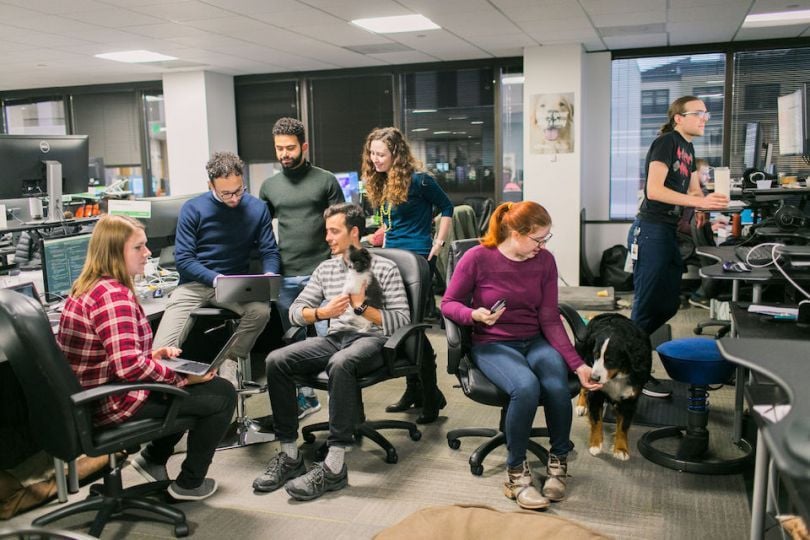
ROVER
Rover connects dog owners with dog walkers, sitters, daycares and groomers. The Belltown-based company, which has acquired two companies and raised well over $300 million since it was founded in 2011, provides its services in a huge number of cities throughout Canada and the United States.
Data Engineering Technical Lead Kendra Iverson started her career in the navy, until she was forced to find something new.
Share the story of how you got into engineering.
I didn’t originally plan to work in engineering but discovered it by gaining more knowledge and technical skills throughout my early career. When engineering found me, I was ready. I am a political science major who graduated from the Naval Academy expecting my career would begin and end as a naval aviator. Unfortunately, a medical issue sent me out into the business world barely understanding how pivot tables worked in Excel and entirely unaware of the world of engineering.
I started in defense contracting, manually reconciling payments where I Googled around until I found ways to streamline the process with VBA. I parlayed that into an analyst role at Amazon where I needed to learn SQL, and where I learned my first lesson in jumping in even if you don't feel ready. Using those newly minted SQL skills, I made the move to an analytical role at Rover in 2014.
As we grew as a company, a data engineering role on the tech team opened up, and while I wanted to apply, I counted myself out of the running because I thought I didn’t have the necessary skills. Fortunately, another technical role opened up later, and I was regretful enough for not applying the first time around that this time I jumped at it — and I got the job! Because I felt like such an imposter in the role, I spent extra hours every week learning everything I could for the job. A year later, I was promoted to tech lead. Now, I’m on the management path and I love what I do.
"Do your best to represent yourself and your achievements, and if there’s a skill they need that you don’t currently have, consider it a negotiation point — not a blocker.”
What is the biggest challenge you've faced in your career, and how have you worked to overcome it?
I am generally my most significant hindrance to advancing in my career. I have stopped myself from applying for a job or raising my hand to be considered for the next level because I wasn’t a master at the full list of qualifications. I would delay my own advancement based on a set of requirements that no one person was ever likely to have. I have been lucky to have colleagues be a champion for me. However, I am now focusing on being my own champion. If I want to do something, I now think of the value I can bring.
For example, I have strong project management skills. In Rover’s earlier days that was very valuable for the tech team, and more than made up for my weaker coding skills. Those skills gave me cross-team visibility and exposure to more opportunities than if I had not taken that first risk.
Any advice or tips for other women pursuing a career in engineering?
Do your best to represent yourself and your achievements, and if there’s a skill they need that you don’t currently have, consider it a negotiation point — not a blocker. If you’re willing to commit to learning that skill, give them a timeframe for it and then don’t give up until you achieve that goal. You’ll gain a reputation in the organization that will allow you to progress to other roles because you have a proven track record of being successful. Rover has been an amazingly supportive environment for this kind of growth, and if you’re at a place where they don’t value that diversity, don’t be afraid to move on.
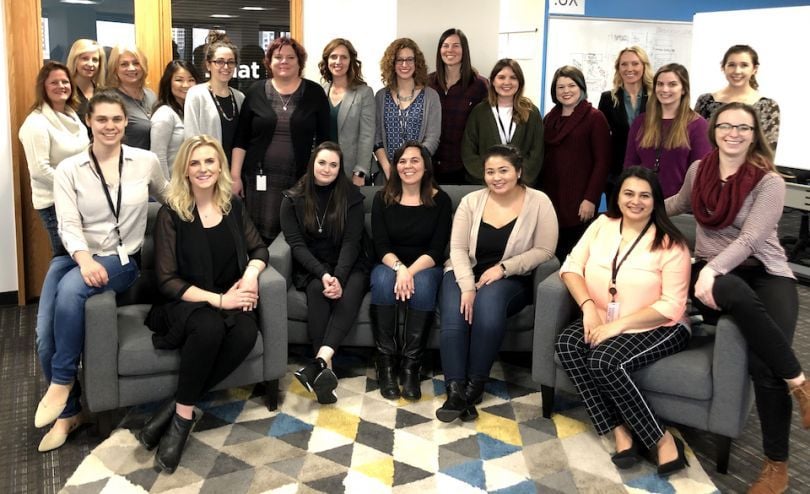
DomainTools
DomainTools’ platform forms part of businesses’ and security solution firms’ cyber protection frameworks. The company links a network’s domains and IPs with just about every domain on the internet, and uses those connections to build risk assessments, profile perpetrators of cyber intrusions, map cyber activity to an attacker’s infrastructure and even help to guide fraud investigations.
With a last name like hers, it was only a matter of time before Security Researcher Emily Hacker realized she should give up the newspaper game and get into cybersecurity.
Share the story of how you got into engineering.
My path into engineering was a winding one. In college, I studied English rhetoric and communications with the intention of becoming a newspaper reporter. I worked at the local city paper for a while toward the end of my college career and quite enjoyed it, but decided that it wasn’t quite what I wanted to do forever. Knowing I was good at writing and interested in technology, I briefly went into technical writing, where I eventually landed on a team of cyber intelligence analysts as their report writer.
While working with them, I realized that I enjoyed the research they were doing and the cybersecurity aspect of their jobs. I quickly began picking up various aspects of their job including research and analysis, until my company took notice and promoted me to the role of a full-time intelligence analyst. Now, after several years of working in cybersecurity, I’ve discovered that research engineering combines the right mix of my skill set and ambitions.
"Don’t minimize the value of your non-technical skills.”
What is the biggest challenge you've faced in your career, and how have you worked to overcome it?
One of the biggest challenges I’ve faced in my career is having to prove my value despite having a non-traditional educational background for my field — especially as a woman. In the past, I’ve worked with various men who have non-technical degrees or no degrees, but who are seen by management as just as valuable as their peers. As a woman, I’ve been told in previous jobs that I shouldn’t expect to advance far in my career because I majored in English.
However, I have worked to overcome this by continuing to provide value and prove my worth. I have attended and taken as many training classes as I can, I have acquired certifications and I produce quality products in my job. Additionally, I have been fortunate to find a company that values my skill set and recognizes the value of a non-traditional background.
Any advice or tips for other women pursuing a career in engineering?
Don’t minimize the value of your non-technical skills. My time spent studying and working in journalism taught me valuable research and analytical skills, not to mention writing and communication skills. These skills are invaluable, not only in a business sense but in solving engineering problems as well. Having a diverse workforce — including diverse skill sets and backgrounds — is imperative to creating an effective and efficient team.
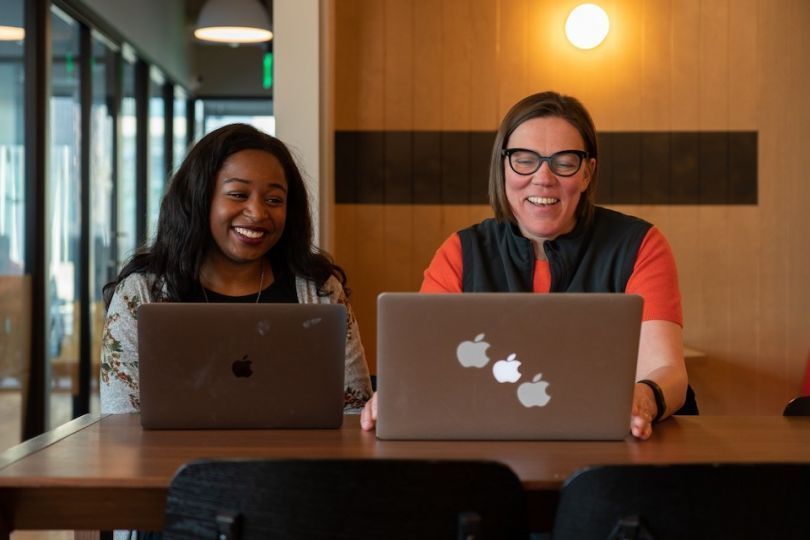
Quantcast
By measuring customer interactions and interests along with broader trends — and applying their handy machine learning algorithms — Quantcast says it can predict the behavior of individual consumers. Brands, publishers and marketers use the San Francisco company’s platform to adapt their messaging for those individuals in real time as they move through the internet.
Staff Software Engineer Katya Rogers recommends finding companies staffed with people you would hang out with outside of work and that work on problems that interest you.
Share the story of how you got into engineering.
As a child, I was exposed early on to STEM subjects and encouraged to pursue a career as a scientist. After obtaining my M.S. in applied mathematics in Russia, I came to the United States and completed my Ph.D. in computer science at Dartmouth College. A key to my success in computer science was having a strong support network.
"Be fearless and choose a company that will allow you to be fearless.”
What is the biggest challenge you've faced in your career, and how have you worked to overcome it?
The biggest challenge for me is balancing the constant desire to learn and grow with life in general. It is easy to be comfortable, and when I find myself at that point, I look for opportunities for work that will challenge me.
Any advice or tips for other women pursuing a career in engineering?
Be fearless and choose a company that will allow you to be fearless. Look for a company that provides a voice to each member of the team, has people you would hang with outside of the office and enables you to work on problems that interest you.
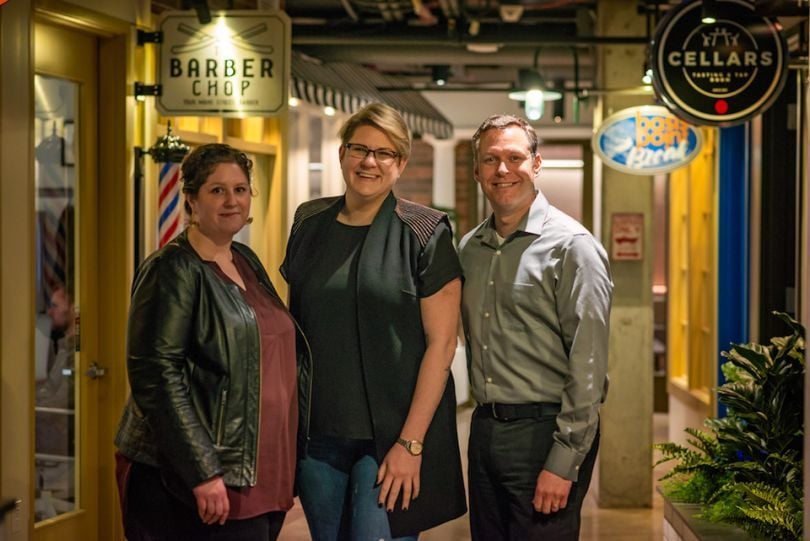
Gravity Payments
When it comes to credit card processing, many small businesses are in a bind: customers rarely carry cash anymore, but the hardware and software they need to accept cashless payments is often expensive, with little in the way of convenience or support from major providers. Gravity Payments seeks to balance the scales, providing credit card processing, e-commerce, point-of-sale solutions and more for small business.
Director of Engineering Jen Peck said she found herself drawn to the tech industry after teaching herself to code.
Share the story of how you got into engineering.
About 10 years ago, after leaving a miserable accounting job, I decided to develop an e-commerce platform selling shoes in large sizes for women. After about nine months of teaching myself how to code, I realized tech was where I belonged, but my first formal tech role was as a business analyst on the store technology team at Nordstrom (where I’d previously been working part-time to pay the bills). If it wasn’t for my manager, Lisa Tanaka, giving me a shot, I’m not sure how far along I’d be today.
"Don’t offer to take notes in meetings; sit at the head of the table next to the CTO and find ways to get your name out there.”
What is the biggest challenge you’ve faced in your career, and how have you worked to overcome it?
I’m a self-taught engineer, so finding ways to show I’m worthy of a technical role has always been my biggest challenge. Eventually, I learned the languages needed to get through whiteboard interviews, but then I networked until I found a group of people who were not just willing to interview me, but were excited about my technical and non-technical skills.
Any advice or tips for other women pursuing a career in engineering?
Find other women you can support and advocate for and be ready to advocate for yourself. Don’t offer to take notes in meetings; sit at the head of the table next to the CTO and find ways to get your name out there. Your success will hinge on your ability to sell yourself as someone trustworthy and important, but you will have to do more work than the average man to prove you’re worthy of respect.
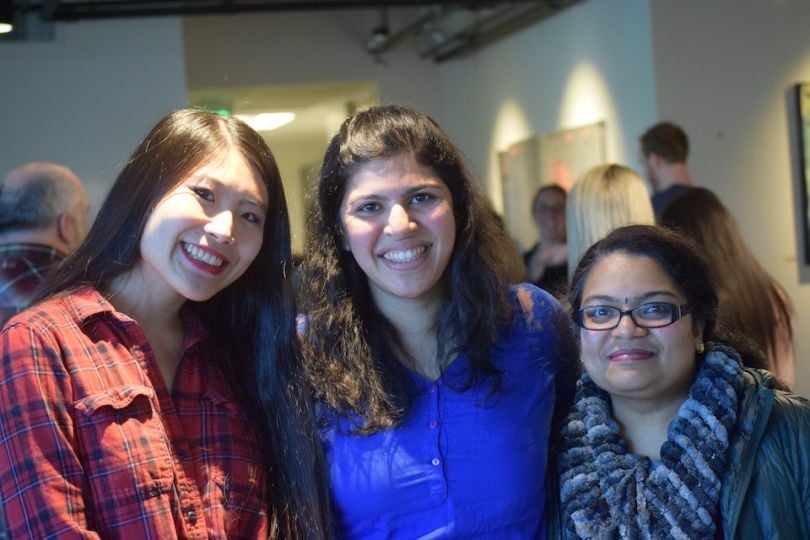
Apptio
Bellevue cloud-based SaaS company Apptio helps businesses manage and optimize their IT spending. The company’s suite of software products include tools for managing cloud service provider bills, IT spending, breaking down costs by vendor and department and forecasting for future budgets. The company went public in 2016, then went private again last year when Vista Equity Partners bought out the company’s stock at a 53 percent premium for shareholders.
Senior Software Development Engineer Wenjie He studied Spanish and sees plenty of parallels in the way spoken and coding languages shape the culture of those who speak them.
Share the story of how you got into engineering.
I wasn’t interested in engineering until I took my first computer science class in college. I liked how projects in that class challenged me to turn interesting concepts into visual outputs while also allowing me to explore creative ways to make the end products unique to me. I decided to minor in Spanish in college first, since I have always been passionate about learning languages and I love the way different grammars and cultural contexts shape communications among people. When learning computer languages, I found similarities between the two. I was fascinated by the way coding translates ideas into something concrete in one’s own way of “speaking” and how it serves as a means of expression.
"The artistic and engineering sides of you are not exclusive — they define you together as a whole.”
What is the biggest challenge you’ve faced in your career, and how have you worked to overcome it?
When I transitioned to another team and got a project that I had no prior knowledge of, it was hard to believe in myself since everything was new and there seemed to be so many things to learn. I overcame the initial panic and fear by setting small milestones, and focused on a few things at a time. The most important first step is always being willing to try.
Any advice or tips for other women pursuing a career in engineering?
Don’t just choose to do something because you can do it; choose because you want to do it, even if that means you are stepping out of your comfort zone. Find something that motivates you both inside and outside of work. There are lots of opportunities out there that could recognize your potentials, and a variety of projects that not only provide a great learning experience for you, but a way to help others.
Don’t let others’ words and labels define you. Try to find a way to integrate computer science with other passions of yours. The artistic and engineering sides of you are not exclusive — they define you together as a whole.
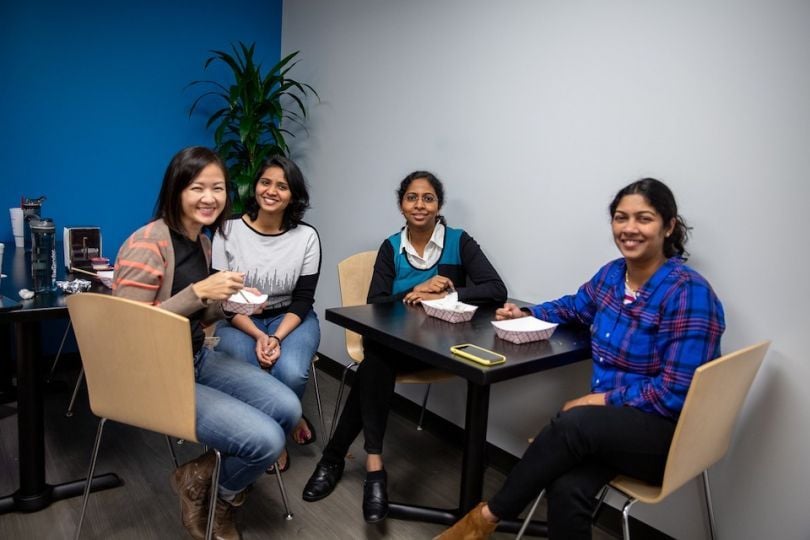
Seagull Scientific
Bellevue-based Seagull Scientific’s BarTender software creates labels, barcodes and RFID tags for businesses. The company has clients in the pharmaceutical, retail, food, logistics and aerospace industries who use the software to organize and track products as they make their way through convoluted production lines.
Software Quality Assurance Engineer Gael Guerard transitioned her career into the industry in her 40s, moved to Seattle and has since worked with some of the region’s biggest tech firms.
Share the story of how you got into engineering.
At age 43, while working as a clerk for a government agency, I went back to school and got an MA in computer information from Webster University. After graduating, I moved to Seattle, where I got my first tech job supporting Windows 95 at Keane, a vender company working for Microsoft. Over the next three years I did IT support contract jobs for Microsoft and Boeing.
I got my first job in QA at Microsoft, testing the localized version of NetShow Server as a contractor. After Microsoft’s Netshow (now Media Player), I worked on Internet Explorer for over a year testing the ISP side of the browser. I then worked full time as a QA Engineer at RealNetworks, where I stayed for several years. Later, I moved into testing apps on cell phones and hand-held devices for almost five years, which included three years with AT&T.
For the last few years I have been on the QA team at Seagull Scientific. It’s been my best job yet, with all the bells and whistles! I love the atmosphere and work ethic here.
"When I first decided to get into the tech industry in 1993, there were not many training options.”
What is the biggest challenge you’ve faced in your career, and how have you worked to overcome it?
My first big challenge was getting the training I needed to get into tech. When I first decided to get into the tech industry in 1993, there were not many training options. I was fortunate that a college extension existed on the Air Force Base where I worked, and I was able to get a computer-related degree by attending classes at night after work.
In 1996, getting the first tech job seemed daunting. There were not that many tech jobs in Albuquerque — and especially for women. I found pages of jobs in a Seattle newspaper and decided to head for the Northwest! Moving to Seattle was the best choice I could have made.
Any advice or tips for other women pursuing a career in engineering?
My best advice is to keep learning and realize you are never too old to learn, change, take on a new challenge or do something new and different. Do what’s in front of you, but always be looking and open to new opportunities. Take calculated risks.
One last bit of advice is don’t take things personally — as you never really know what someone else is thinking — so best not to stress out about the unknown or out of your control.
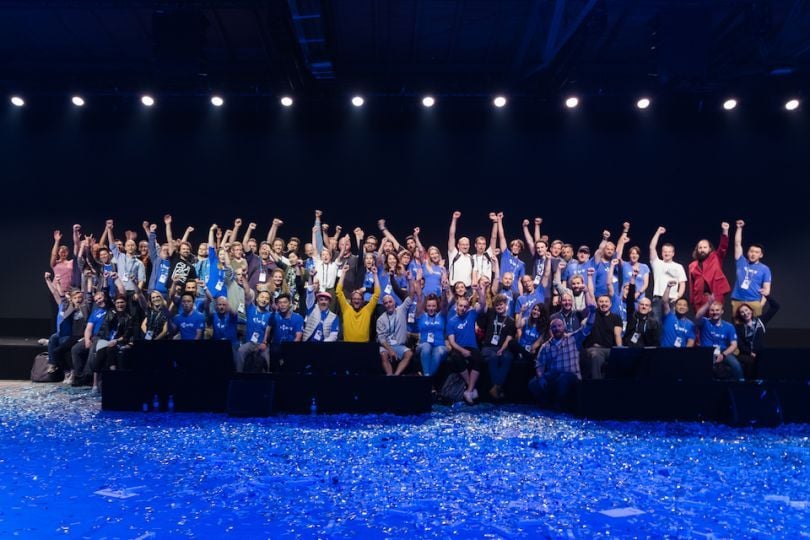
Unity Technologies
Unity Technologies makes tools for developers to build games along with 3D, VR and AR experiences. Those tools have ended up in apps used on a staggering 2.7 billion devices in the last 12 months. Headquartered in San Francisco, the company recently topped Built In Seattle’s Best Places to Work in 2019.
Software Engineer Abba Pamela Nelson recommends finding a mentor or, at the very least, someone to bounce ideas off of.
Share the story of how you got into engineering.
I got into engineering a little bit by accident. I went to the University of Nevada, Reno with aspirations to become a math teacher but quickly discovered that teaching wasn’t for me. When contemplating my next major, one of my friends said, “Hey, you’re really good with computers. Maybe you should try computer science.” As soon as I took my introductory courses in computer science, I knew it was the perfect fit.
"I frequently remind myself that not everyone knows everything, and that’s okay!”
What is the biggest challenge you’ve faced in your career, and how have you worked to overcome it?
My biggest career challenge and probably an ongoing challenge is overcoming my impostor syndrome — I have a tendency to doubt my abilities. To mitigate that, I always try to get to know coworkers. Once you realize they are human beings who also have questions and make mistakes, it really helps. I also frequently remind myself that not everyone knows everything, and that’s okay!
Any advice or tips for other women pursuing a career in engineering?
Always try to find a mentor. It doesn’t matter the level you’re at or the focus of your career, engineering or otherwise. And it doesn’t have to be a formal mentor, it could be someone that you know can be a resource for you in a specific area. At my last job, I didn’t have a mentor and it was really difficult to not have someone to turn to, even just to bounce ideas off of.
-----
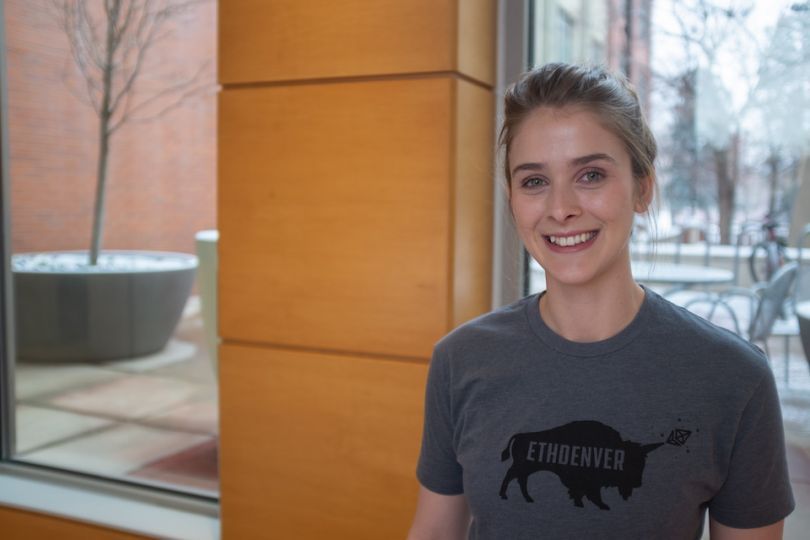
Backbone
The process of bringing new consumer products to life has, for years, been fraught with manual errors and communication breakdowns, but Backbone aims to change all that. Its product lifecycle management platform automates the design and production process for consumer goods companies, helping to reduce lead times throughout the supply chain and get to market faster.
Full Stack Engineer Joscelyn James shared how her love of tinkering turned into a career in tech.
Share the story of how you got into engineering.
Ever since I can remember, I have been a tinkerer. I've always enjoyed working on cars, building computers and assembling Legos. Naturally, I was drawn to coding right away, as I found that it was a perfect balance of creativity and logic. I was first introduced to coding through my brothers. They both went through Galvanize, and I soon followed. My only regret is that I didn't do it earlier!
...Don't give up. There will be tough roadblocks along the way. Just remember that it’s natural.”
What's the biggest challenge you've faced in your career, and how have you worked to overcome it?
Honestly, every day is a new challenge in the startup world. The biggest challenge I faced was in my first month of working when I was handed my first big feature. I probably spent three hours just clicking through the 30 or so pages on Invision. I felt so overwhelmed. Luckily, I had — and still have — a great team of engineers who were patient with me and helped me along the way. Now, my process still consists of three hours of looking through Invision, followed by filing detailed tickets in Jira, all while maintaining constant communication with the design, QA and customer success teams.
Any advice or tips for other women pursuing a career in engineering?
I would encourage women to get involved in the community by looking for nearby meetups, attending a dev happy hour or going to a conference. You can find amazing support groups of women from Boulder to Denver that are all about getting more women into technical roles. There are plenty of women-only events out there as well. Also, don't give up. There will be tough roadblocks along the way. Just remember that it’s natural. Don't be afraid to ask questions or take extra time to research and understand a concept.
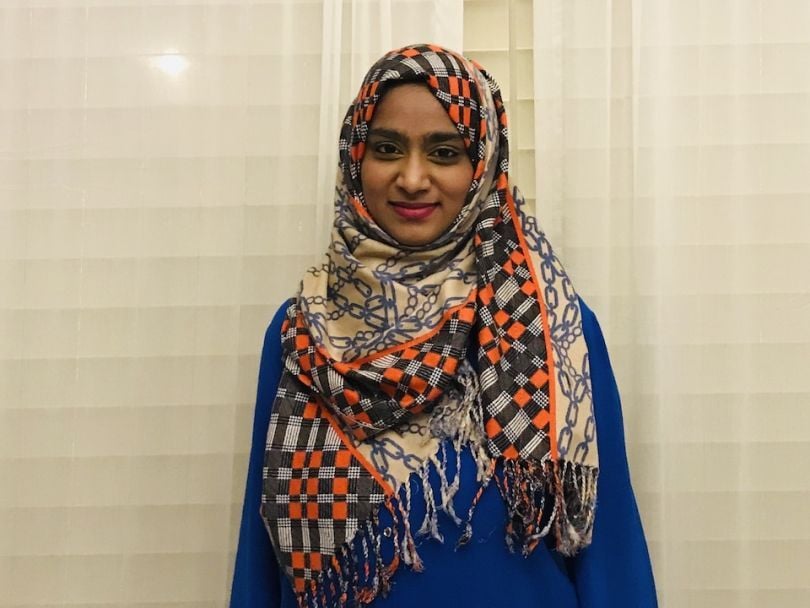
Travelers Haven
Travelers Haven — and its sister company Hotel Engine — help businesses manage the ins and outs of short-term employee housing with a full-service booking platform that leans on intuitive technology and a team of customer-facing experts.
Software Engineer Tahura Abdul, who works on Hotel Engine’s tech team, got candid about her initial reluctance to pursue a career in tech and how she overcame it to discover a field she now loves.
Share the story of how you got into engineering.
In college, I was working towards a career in non-western medicine, which turned out to be a near-impossible path to follow. My father, knowing my skillset and being a Java developer, suggested I consider a career in software engineering. At first, I thought, “Oh man! Programming?! That's so geeky!” I didn’t want to be that nerd who sits in a cube looking at a computer for eight hours. Surprisingly, that wasn't the case. I figured out that software is all about solving “scavenger hunts” and becoming a sleuth — which I love! I feel like every problem has a set of clues just waiting to be found.
I used to be scared to be a developer, but we need people to know this job isn’t just for those who have always been into computers their whole lives.”
What is the biggest challenge you've faced in your career, and how have you worked to overcome it?
Coming from a science background, I had no idea how computers operated, and this bothered me. I felt as if, in order to be a good programmer, I needed to understand my new industry from the bottom up. I set out to overcome this by starting from scratch — learning the details of computer hardware and networking. How does our information really get passed from one computer to another? How do different languages interrelate? How do foreign APIs communicate? Starting with the basics really helped me understand the bigger picture, which in turn helped me code more confidently.
Any advice or tips for other women pursuing a career in engineering?
Being one of the few girls in the software engineering world, it makes me proud to be here. I used to be scared to be a developer, but we need people to know this job isn’t just for those who have always been into computers their whole lives. This is a place where women are greatly welcomed and a place where, if you work hard, you can do amazing things.
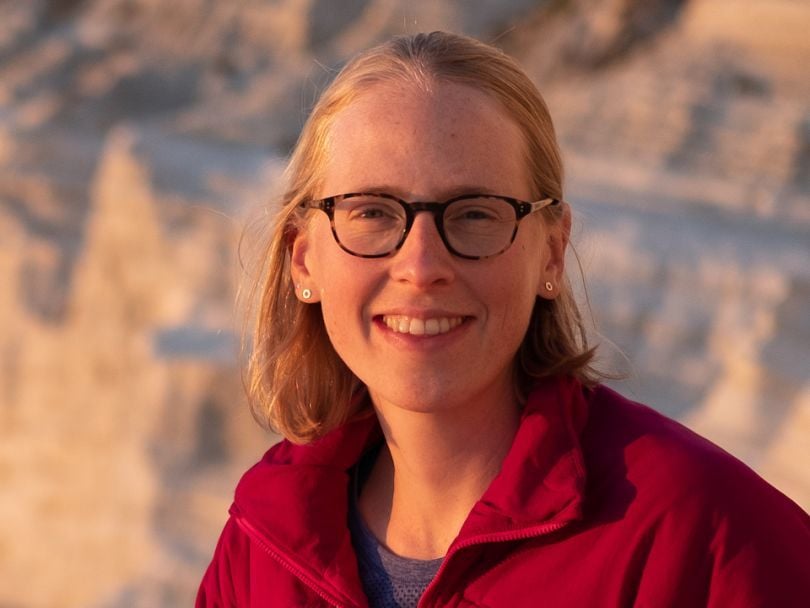
Recurly
The shift toward subscription-based business models has transformed the way we utilize software and services, but with that has come an ever-evolving list of challenges — particularly when it comes to billing. Recurly’s subscription management platform helps businesses navigate those challenges with ease while maximizing and automating revenue growth.
We caught up with Technical Lead Kelsey Schlarman to learn what sparked her passion for programming — and how she keeps that passion alive day after day.
Share the story of how you got into engineering.
My first exposure to computer science was a digital electronics class that I took as a junior in high school. After that, I learned a bit of programming on my own from a book on C. I found the logic and problem solving so engaging that I took a leap of faith and declared computer science as my major when entering college.
Computer science is an incredibly broad field ... Explore what is out there, and find what fuels your passion.”
What is the biggest challenge you've faced in your career, and how have you worked to overcome it?
My first job out of college was rough. I wasn't growing as a developer, and I often dreaded going to work. I spent a long time blaming myself and questioning if I really belonged in this industry. Eventually, I doubled down on personal projects and picked up new languages, which reignited my passion for programming. This led me to finally switch jobs, and I landed in a much happier place.
Any advice or tips for other women pursuing a career in engineering?
Computer science is an incredibly broad field, and not every language, application or company will suit your interests or support your ambitions. Explore what is out there, and find what fuels your passion.
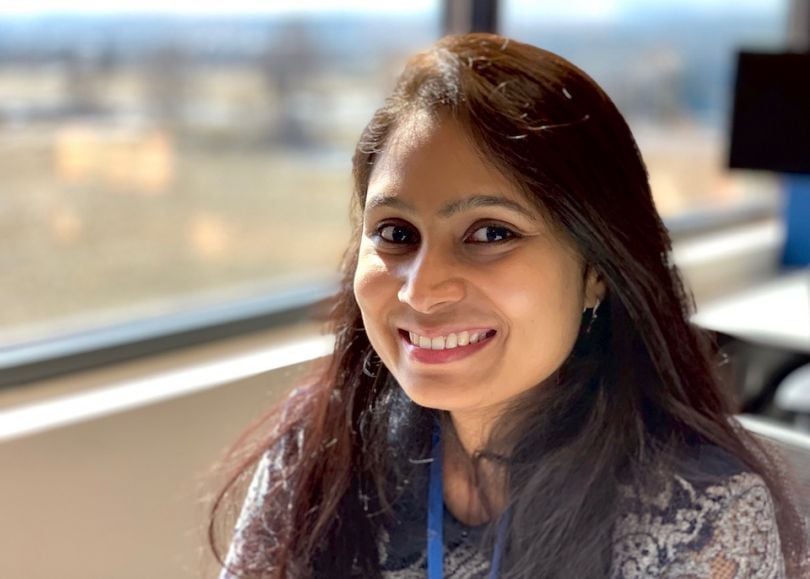
Tek Experts
Tek Experts takes its name seriously. Leveraging its team’s collective technology expertise, the Colorado Springs-based company supports businesses in their efforts to better serve their customers with services like software development and support, customer success management and sales, and business development services.
Technical Support Engineer Pratyusha Adavalli talked to us about her journey through STEM and how she’s navigated career challenges along the way.
Share the story of how you got into engineering.
I graduated with a bachelor’s in electronics and communication engineering. At first, it was a love for creativity and problem solving that led me to pursue a STEM career.
As part of my final year project, which was "noise reduction for an image," I used a simulation software that helped me not only achieve the goal of the project but also helped me realize that computer software is a very powerful tool that helps the user observe an operation without actually performing that operation. After that, I became passionate about computer programming and software. Currently, my primary focus is on my role as a software support engineer.
Be persistent. If some technology project doesn't make sense but you are persistent until the end, everything will eventually add up and make sense.”
What is the biggest challenge you've faced in your career, and how have you worked to overcome it?
When I started my first job, it was like drinking through a firehose. At first, it was difficult to connect the dots, but with patience, perseverance and the right mentoring, everything fell into place. On the other hand, moving to a new country and starting a career is a different challenge. I missed my family, and I had to learn the culture and get acclimated to the weather.
Any advice or tips for other women pursuing a career in engineering?
- Having the mindset that technology is fun will help anybody get their foot in the technology door.
- Find a mentor who will help and encourage you to pursue your passion. In my case, I was lucky to have my father as my mentor.
- Be persistent. If some technology project doesn't make sense but you are persistent until the end, everything will eventually add up and make sense.
- Learning is fun. If you want to be in engineering, you have to be a constant learner.
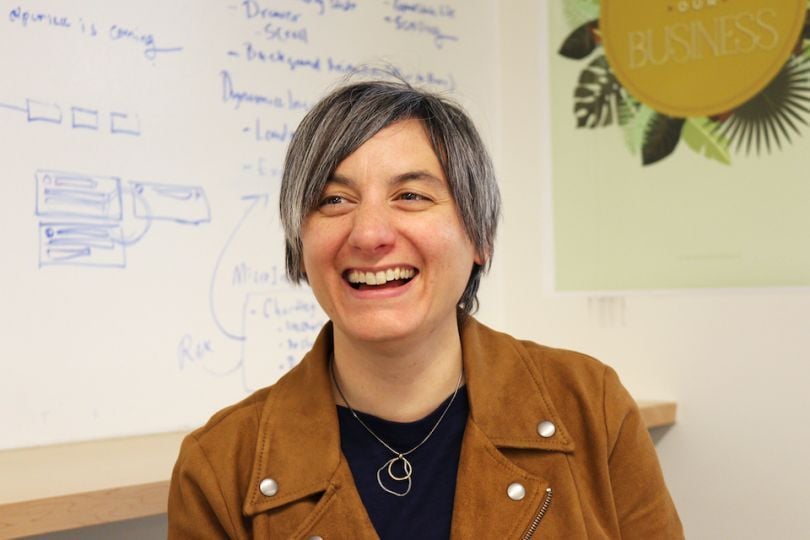
IHS Markit Digital
IHS Markit Digital combines design, development and data to helps businesses turn their complex financial information into intuitive and interactive visualizations and workflows. Its tech platform empowers businesses to display their data in a way that’s approachable, actionable and insightful, enabling them to better engage their clients.
Chief Operations Officer Renee Spampinato shared how she’s nurtured her knack for coding and made her voice heard — despite stereotypes or gender inequities.
Share the story of how you got into engineering.
In high school, I signed up for the only programming class offered at the time: Basic. The funny part was my guidance counselor tracked me down because she assumed it was a mistake and that I intended to sign up for typing class! I immediately had an aptitude for coding and decided to apply to computer science programs for college.
Throughout my career, I’ve often found myself one of the few women on delivery or management teams. I’ve worked hard to make sure my thoughts and ideas are heard.”
What is the biggest challenge you've faced in your career, and how have you worked to overcome it?
One of my biggest challenges has been building successful offsite delivery teams from the ground up. I’ve done this on multiple occasions, some in time zone and some halfway around the world. Not only is there the challenge of onboarding a brand new team in a new location, but I’ve also had to establish a new way of working within the organization locally.
Any advice or tips for other women pursuing a career in engineering?
Make your voice heard! Throughout my career, I’ve often found myself one of the few women on delivery or management teams. I’ve worked hard to make sure my thoughts and ideas are heard.

